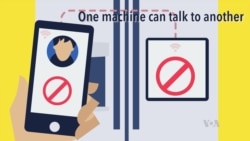Eleven hours after a cyberattack first hit the United States Friday, the internet traffic company Dyn said the issue had been resolved.
The disruptions began in the United States, then spread into parts of Western Europe, causing an internet outage that affected several popular websites, including the social network Twitter, money transfer service PayPal, music-streamer Spotify and the discussion site Reddit.
Dyn, a New Hampshire company (in the northeastern U.S.) that manages crucial parts of the internet’s infrastructure, said it was under attack around 1100 UTC.
Dyn, whose servers reroute internet traffic by hosting the Domain Name System (DNS), said it had resolved the first attack, only to face a second one around 1700 UTC. After fending off that second attack, Dyn said it was again experiencing problems Friday evening. At the time, the company said it was investigating “several attacks.”
Those were reported to be “resolved” around 2200 UTC.
WATCH: White House spokesman Josh Earnest on what they know
Internet users affected by the outage experienced sluggish surfing.
The attack, called a distributed denial of service (DDOS) attack, occurs when hackers flood particular servers with internet traffic until they cannot handle the load and shut down.
Such attacks are relatively common, but the unprecedented scale of the latest one indicates that they are becoming more powerful and sophisticated.
Dyn chief strategy officer Kyle York said that some of the traffic which caused the attack was from devices such as baby monitors, webcams, home routers, and other devices which can connect to the internet. Security experts have long warned that the increasing number of devices which have internet access, or "The Internet of Things" will lead to new and challenging security risks.
None of the websites which became slow or inaccessible were affected themselves. Targeting host companies such as Dyn can cause more damage and on a larger scale than attacking single websites.
The U.S. Department of Homeland Security said it is investigating “all possible causes” of the outage.
White House spokesman Josh Earnest called the attack malicious, but said he had no information about who could be behind it.
The attack also affected Airbnb, Netflix, Etsy, SoundCloud and The New York Times.








